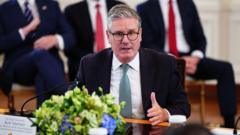Is the Normal People Author Facing Arrest for Supporting a Terrorist Group?

Sally Rooney's Bold Stand: Support for Palestine Action and the Controversy Surrounding It
In a climate marked by political tensions and controversies, Sally Rooney, the acclaimed Irish author, has made headlines once again. With a track record of bestselling novels such as Normal People and Conversations with Friends, Rooney has now positioned herself at the intersection of literature and activism. Her recent pledge to support Palestine Action, a group now classified as a terrorist organization in the UK, raises questions about artistic freedom, governmental authority, and the role of authors in political discourse. This article delves into the implications of Rooney's actions, the response from various stakeholders, and the broader societal context in which this controversy unfolds.
The Background of the Controversy
Palestine Action, founded in 2020, aims to end what it describes as Israeli apartheid. The organization has garnered attention for its direct-action tactics, which have included protests and vandalism against companies allegedly complicit in arms sales to Israel. In June 2021, activists caused significant damage to military jets at RAF Brize Norton, leading the UK government to officially proscribe the group. Since then, over 700 individuals have been arrested for participating in Palestine Action protests, raising concerns about civil liberties and the right to protest.
Amidst this backdrop, Rooney’s decision to support Palestine Action is particularly notable. In a recent article in The Irish Times, she stated her intention to use the residual fees from her published works to fund the organization’s efforts. This declaration has drawn both support and criticism, highlighting the polarizing nature of the Israel-Palestine conflict and its impact on public figures.
Rooney's Declaration of Support
In her public statement, Rooney expressed her solidarity with Palestine Action and those arrested in recent protests. “I feel obliged to state once more that – like the hundreds of protesters arrested last weekend – I too support Palestine Action,” she wrote. This bold assertion underscores her commitment to using her platform for advocacy, regardless of potential legal repercussions. Rooney appears unfazed by the risks associated with her stance, indicating that she is prepared to face the consequences, even if it means being labeled a “supporter of terror” under UK law.
Her comments resonate with many who feel disillusioned by the current political climate in the UK. Rooney articulated concerns that the government is infringing on the rights of citizens to express dissenting opinions, particularly regarding the ongoing conflict in Palestine. The implications of her actions reach far beyond her individual career; they touch upon fundamental issues of freedom of expression, artistic integrity, and the responsibilities of public figures.
The Legal Context and Implications
Under the Terrorism Act 2000, supporting a proscribed organization in the UK can result in severe legal consequences, including imprisonment for up to 14 years. This has raised questions regarding the implications for Rooney, as her public support for Palestine Action could be construed as a violation of the law. However, it is essential to note that the organization is not banned in Ireland, where Rooney resides. This discrepancy highlights the complex and often contradictory nature of laws regarding activism and free speech across different jurisdictions.
Furthermore, the BBC, which has funded adaptations of Rooney's novels, has distanced itself from her recent actions, stating that matters relating to proscribed organizations are for the relevant authorities. This caution reflects the delicate balance that public organizations must maintain when navigating political controversies, particularly those with potential legal ramifications.
Responses from Stakeholders
The reaction to Rooney's declaration of support has been mixed. Dr. Jilan Wahba Abdalmajid, the ambassador of Palestine in Ireland, publicly endorsed Rooney's stance, commending her for using her voice to highlight human rights violations in Palestine. This endorsement from a diplomatic figure emphasizes the significance of Rooney's actions in the context of international advocacy.
Conversely, critics argue that supporting a group labeled as a terrorist organization undermines the severity of real acts of violence and terror. They contend that Rooney's actions may inadvertently legitimize violent tactics and provoke further division in an already polarized debate. The tension between advocacy and the potential for harm is a crucial point of contention in discussions surrounding Palestine Action and similar organizations.
The Broader Implications for Cultural and Intellectual Life
Rooney's stance brings to light the profound implications for cultural and intellectual life in the UK. The author believes that the government’s actions to restrict dissenting opinions have far-reaching consequences for freedom of expression and artistic creation. As artists and writers navigate the complex landscape of political activism, their works may increasingly reflect the challenges and moral dilemmas posed by contemporary issues.
This scenario raises critical questions about the role of authors in political discourse. Should writers use their platforms to advocate for causes, even at the risk of legal repercussions? How can they balance their responsibilities as artists with their desire to effect social change? Rooney’s situation exemplifies the challenges that public figures face in an age of heightened political scrutiny and division.
Conclusion: The Intersection of Literature and Activism
Sally Rooney’s decision to support Palestine Action has ignited a firestorm of debate about the intersection of literature and activism. As she continues to navigate the complexities of her position, her actions serve as a case study in the challenges faced by public figures who dare to engage in politically charged discussions. The ramifications of her support for Palestine Action are yet to unfold, but the conversation surrounding her stance is likely to resonate far beyond her individual case.
In a world where the lines between art and activism are increasingly blurred, Rooney’s bold stand invites us to reflect on the responsibilities we hold as individuals and as a society. As we consider the implications of her actions, we must ask ourselves: How far are we willing to go in the pursuit of justice, and at what cost?
FAQs
What is Palestine Action?
Palestine Action is a direct-action network founded in 2020, aimed at ending Israeli apartheid. The group is known for its protests and direct-action tactics, which have included vandalism against companies involved in arms sales to Israel.
What are the legal consequences of supporting a proscribed organization in the UK?
Under the Terrorism Act 2000, supporting a proscribed organization can result in severe penalties, including imprisonment for up to 14 years.
What has been the response to Sally Rooney’s support for Palestine Action?
Responses have been mixed, with some supporting her stance as an important act of advocacy, while others criticize it as potentially legitimizing violence associated with terrorism.
As we navigate the complexities of activism and artistry, one must ponder the following: How do we reconcile the desire for social change with the potential repercussions of our actions? #SallyRooney #PalestineAction #Activism
```Published: 2025-08-19 07:42:07 | Category: Entertainment



